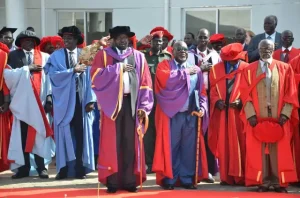The South Sudanese Judiciary We Do Not Want
The judiciary is the arm of government responsible for administering justice. The 2011 constitution establishes it under Part Seven and is covered under Articles 122-134. The fundamental constitutional principle is that the judiciary must be independent of other government arms of government_ executive and legislature. Basically, administrative, financial and decisional independence is critical for preserving the rule of law and protecting human rights and fundamental freedoms.
The question is whether the judiciary, as presently constituted, has been able to fulfil its constitutional mission, and mandate, and meet public expectations. Records show that the South Sudan judiciary is old-fashioned and stubbornly insular. A 2017 Justice Needs and Satisfaction Survey reveals that 56% of South Sudanese prefer traditional justice mechanisms over the formal justice system (39%). And that is not only a matter of preference. In fact, of all the surveyed respondents across South Sudan, 58% confirmed their satisfaction with the quality of legal services the traditional legal system delivers. Only 45% of the surveyed respondents said they were satisfied with the justice the formal courts deliver. These findings indicate a crisis of public confidence in the judiciary.
Perhaps a look at the internal working of the judiciary may help us understand the magnitude of the crisis in the judiciary. In an interesting revelation, neither the Supreme Court nor courts at state levels maintain nominal rolls. National Audit Chamber (Sept 2021) Report revealed that the judiciary had no nominal roll for all judges in the year 2020, “….and hence confirmation and verification of names and grades of all judges and support staff in salary pay sheets against the names and grades in the approved nominal rolls was not possible”(p.6). This sounds like a joke, but without nominal rolls, administrative tasks cannot be accomplished. In fact, case backlog is a systemic problem, with cases filed taking more than a year to be determined and appeals hanging up there for ages. Judges are often unavailable in the formal justice sector and appearing when they wish. These are serious indictments against the judiciary.
But one of the obstacles to the judiciary achieving its mandate is also the quality of leadership. Proper administration of the judiciary is critical to addressing challenges facing the judiciary. Yet, numerous events show the leadership vested in the Chief Justice for the proper administration of the judiciary undermines its performance. Allegations of corruption are common within the judiciary, including in the recruitment process and assignment of judges. When Justice Clement Kuc, a court of appeal judge, resigned in 2013, he accused the chief justice of nepotism. He also cited a lack of transparency and competence in the judiciary due to the chief justice. Many legal practitioners in South Sudan charge the chief justice of privatizing and personalising the judiciary, poor attitude, and dictatorship. These examples, perhaps, show why the judiciary seems irrelevant in addressing social, economic and political disputes in the country. A leadership crisis in the judiciary affects the proper functioning and timely delivery of justice.
Perhaps some may argue that the elephant in the room may have little to do with the internal working of the judiciary or the leadership crisis but political interference that undermines judicial independence. Examples abound in this regard. The first example was when President Kiir removed Justice Madol Arol, then Deputy Chief Justice, and replaced him with John Gatwich Luol without confirmation of elements of gross misconduct, incapacity or recommendation by the Judicial Service Commission. The second instance relates to when Mr President Kiir scuttled internal attempts to right the internal rot in the judiciary and sacked the 14 judges championing internal reforms. While these arguments of political interference are legitimate, they represent just the other side of the coin_ old-fashioned and irrelevant judiciary.
It is the judiciary South Sudanese do not want. The problem is that only a few people understand the magnitude of the rot in the judiciary. If we don’t transform the current judiciary and then create an effective, transparent, professional, responsive and people-friendly judiciary to advance the cause of the rule of law and protection of human rights, our people will continue to settle their differences outside the formal justice system_ including armed rebellion.





Dear Counsel Mading Gum,
You have said all. Our judiciary is too deformed and decayed to the core. There’s a need to overhaul it and bring in talented lawyers and set up proper judiciary devoid of political interference.
What we have is not judiciary but something akin Bilpam in its style.
Where on earth you refused stay of execution and appeal stays for years to be determined. We do not have judiciary. I concur.
Environment is the most ignored field and is life.
Dear learned colleague,
You did hit the nail on top. Our judiciary as well as the Ministry of Justice are both on the sickbed at ICU. It will take a huge and brave move to rectify the mess in South Sudan judicial system. Thank you for your post.
In all honesty, what you have just said is convincing, reliable and proper but most importantly of all, it is the lack of independent of judiciary from the executive branch of the government spearheaded by the President himself who plays his chest game in the judiciary for his benefits in order to avoid anything that tempers with his thooc (Throne).
If what we had studied in the principle of separation of powers is not what is being practiced, then two things suffice. Either to make reforms in the judiciary of South Sudan that begins with chief justice or such legal principles should be omitted from our curriculum because it would be a waste of time to lecture what can’t be practiced.
I don’t even want to talk about the accumulation of appeals before the court of appeal circuits of four regions of South Sudan and before the supreme Court. It is only the cases that caught attention of the public and media that are decided in shorter time than the rest. Example, the recent Aweil case and that of two kids slain by one Emmanuel.
In summary, the old-fashioned judiciary is for the late 19th and 20th century. In 21st century, it is either a judge fits in, or gives a way to those who can!
That’s all I can say.